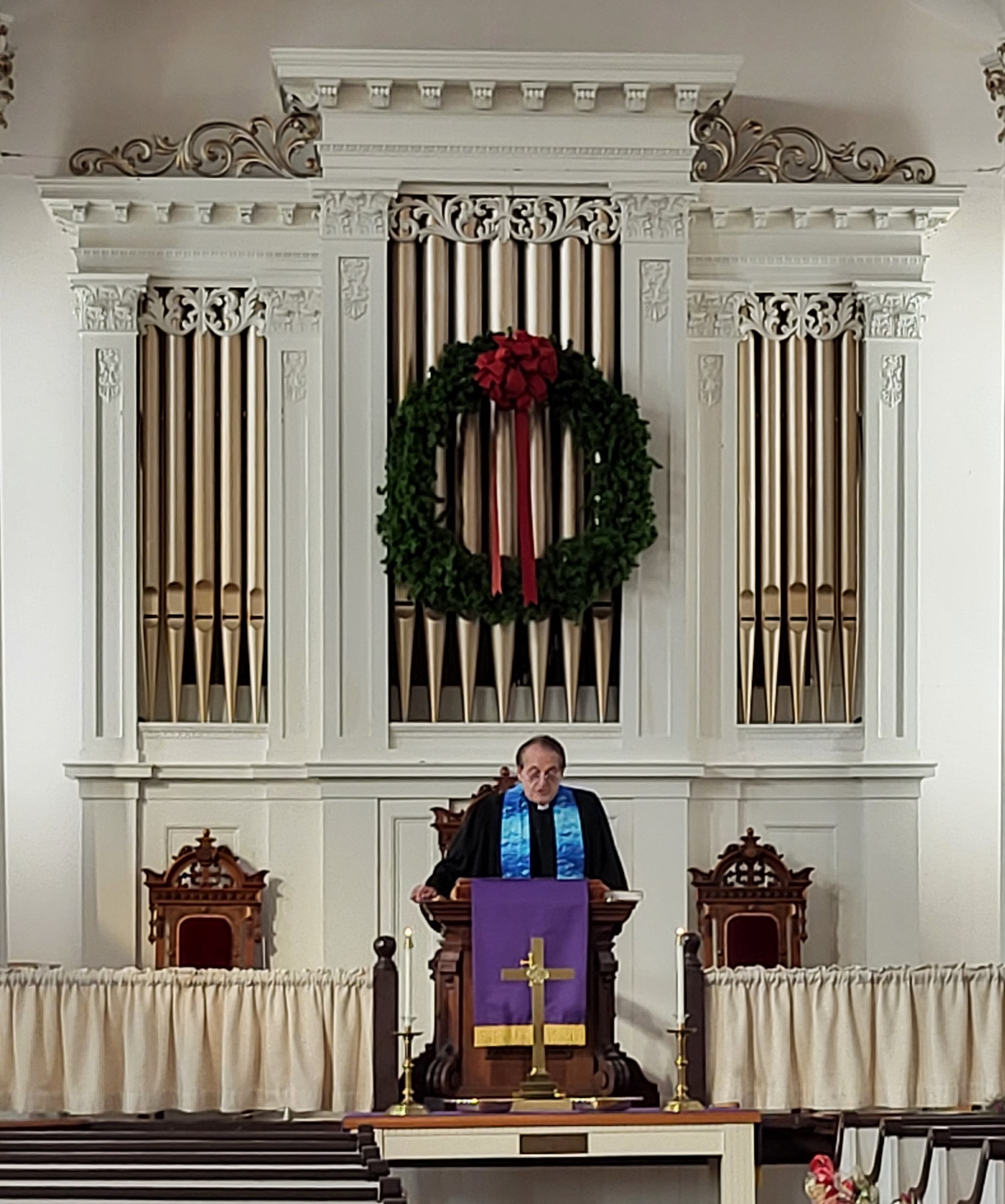Sermon Sunday December 8, 2024 – Second Sunday of Advent – Candle of Peace
Rev. Norman A. Michaud
“All Flesh Will See”
Luke 3: 1-6
The four weeks of Advent call for extravagant welcome, radical love, integrity, and justice. Advent also seeks our forbearance and patience. Advent asks us to focus on a different but linked declaration each week. Hope, Peace, Joy, and Love anticipate the coming of an infant who will bring each word or concept as living light into our lives. We trudge through our days hoping for miracles. Still, we often need to be more cynical and sophisticated to see and proclaim witness to miracles. But miracles are always around us, although we usually fail to see or understand the miracle happening.
This Sunday, we have again lit the first candle of Hope, and now the second candle of Peace shines brightly. I read the commentaries by theologians before I write my sermons. I discovered none of my go-to resources spoke of Peace when those sources examined Luke 3:1-6. However, I forget the word Peace is translated from the Hebrew word, Shalom. The common understanding of Peace is the absence of conflict or war, but in Hebrew, Peace means so much more. In Hebrew, shalom, or Peace, is defined by the wholeness of a person’s well-being. This week we focus on Peace, ending human conflict, and finding wholeness in spirit through repentance.
John the Baptist dwelled in the wilderness and preached to those who sought his words. He is found in the middle of nowhere, which becomes somewhere when those who seek him surrender to the mystery of God.
The setting of today’s reading from Luke locates John in the wilderness. Our introduction to John the Baptist, Jesus’ cousin, tries to place John and Jesus in a physical place and time. In Luke’s time, as in Acts, he used names and places his audience would know. Through John the Baptist, we bridge from the prophet Isaiah to the present.
Luke also weaves the people of the time, the rulers of Rome, and names of the Hebrew high priests into his declarations. All will know the historic time. His words set the era and place.
Luke has John the Baptist shout that we must, “Prepare the way of the Lord, make his paths straight.”
Rome was excellent at binding regions of its empire with roads that supported the Roman economy and military control. Jerusalem would be destroyed once it threatened Roman sovereignty. The troops that kept the Peace of Rome could rapidly crush any opposition.
Rome created new landscapes. The roads allowed goods and services to access municipal hubs faster than ever before. These roads were paved and allowed wheeled transport to accelerate commerce. Clear-cutting and paving stones made the way straighter and smoother than ever before.
Paul used Roman infrastructure to spread the Gospel, walking from place to place and port to port. This function of Roman infrastructure would allow for the spread of Christianity. Jesus himself would use such roads to perform his ministry. Eventually, the Fall of Rome itself would come from its infrastructure. After Rome collapsed, Western Civilization would enter its “Dark Ages” when its enemies used Roman roads to invade Rome itself. The Romans had straightened many paths, including paving their way to their destruction.
In Luke’s Book of Acts, we see the power of these roads through the travelogues presented by Paul’s and Luke’s journeys. But John the Baptist was a wild man in the wilderness. He relied on locusts and honey and was seen as an absurd presence in the wilderness, away from the easy scrutiny of Rome. He was a backwater guy shouting in the backwaters of Jewish authority, which relied on Roman power and commerce to fill its coffers with cash.
John’s challenge is to repent and prepare. True repentance (metanoia in Greek) means to change one’s mind. John calls all people to turn to God, to seek God’s Grace, and to prepare for the New Covenant. Our repentance, our turning around, may call us to action. “Prepare the way this Advent,” the prophet John cries out.
John the Baptist challenges people to prepare and examine their lives, values, and priorities. In church, John the Baptist’s message calls for repentance. John confronts us, commands our attention, and demands a response. John’s challenge is to repent and prepare. John calls all people to turn to God and from sin, to seek God’s forgiveness, and to prepare the way for God’s coming to his people. John the Baptist invokes the prophet Isaiah, who called all people to prepare for the Messiah by making paths straight, lifting valleys, and flat rough paths.
The punch and promise of the poetry are saved for last: “All flesh shall see the salvation of God.” Prepare the way of the Lord! If that is the central message of our passage, there is meaning in God’s choice of John, the wilderness-dweller, as a messenger. In Luke, the word of God comes not to the Emperor, the governors, and not even the high priests. It comes to simple John, son of Zechariah, whom Luke introduces in the first chapter of his Good News. John the Baptist is a great prophet who prepared the way for Jesus. Still, compared with his day’s political and religious leaders, he was just an ordinary guy—and yet, God chose John to be the messenger.
God sent the message to John, not in Rome or Jerusalem, but in the wilderness. Not the seat of political or religious power, but the wilderness, the often scary and confusing place where God had spoken to God’s people in the past and through which God had led God’s people to a new and promised life. God’s choice of John and where God spoke to John indicate what God expects from us. Our repentance and turning around will likely involve us looking at the structures, systems, and people of the world around us in new and different ways. “Prepare the way,” the prophet John cries out. John makes us uncomfortable. Maybe this is the Advent preacher’s job as well—to make us uncomfortable enough truly to repent and prepare for the coming of Jesus.
Hope comes to us in the simplicity of John the Baptist, who will recognize Christ in his cousin, Jesus. The Messiah would soon stand before him, and John would Baptize him. John’s fulfillment of the Baptism of Jesus asserts that Jesus is the Messiah, Emmanuel. Through Christ, God welcomes All to love our neighbor and ourselves, which shows our love for God. No matter where we are on life’s path or where we may encounter our Sisters and Brothers, God’s path to Grace and Hope will be fulfilled on Christmas Day.


